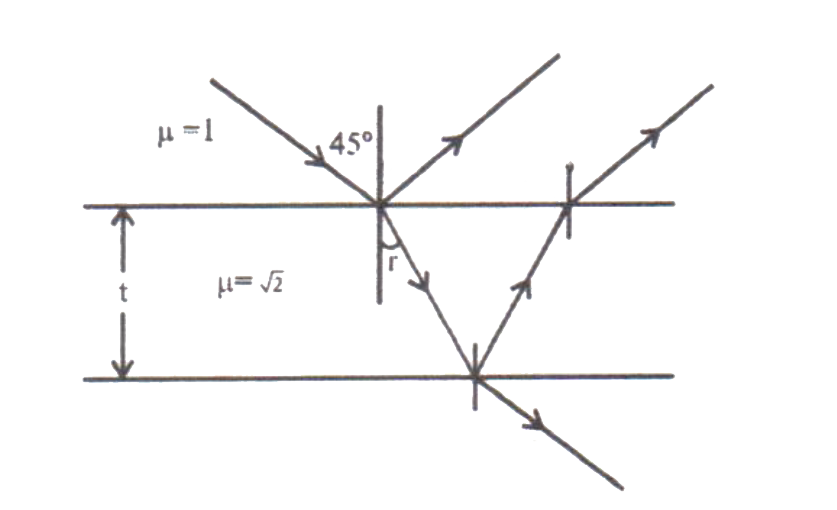What is the minimum thickness of thin film required for constructive interference in the reflected light through it ?
(Given, the refractive index of the film =1.5, wavelength of the lilght incident on the film =600 nm.
100nm
200 nm
50 nm
200 nm
The correct Answer is:A
Condition for constructive interference
2μt=(2n+1)λ/2
For minimum thickness n=0
t=600×10−94×1.5=100nm
Topper's Solved these Questions
- WAVE OPTICS AND ELECTROMAGNETIC THEORYBOOK - ERRORLESSCHAPTER - WAVE OPTICS AND ELECTROMAGNETIC THEORYEXERCISE - NCERT BASED QUESTIONS (Young’s Double Slit Experiment and Biprism)
50 Videos
- WAVE OPTICS AND ELECTROMAGNETIC THEORYBOOK - ERRORLESSCHAPTER - WAVE OPTICS AND ELECTROMAGNETIC THEORYEXERCISE - NCERT BASED QUESTIONS (Diffraction of Light)
20 Videos
- RAY OPTICSBOOK - ERRORLESSCHAPTER - RAY OPTICSEXERCISE - Assertion & Reason
30 Videos
Similar Questions
Calculate the minimum thickness of a soap bubble film (μ=1.33)that results in constructive interference in the reflected light if the film is illuminated with light whose wavelength in free space is λ=600nm.
View SolutionFind the minimum thcknessof a film which will strongly reflect the light of wavelength 589 nm. The refractive index of the material of the film is 1.25.
View Solution
Knowledge Check
What is the minimum thickness of thin film required for constructive interference in the reflected light through it ?
(Given, the refractive index of the film =1.5, wavelength of the lilght incident on the film =600 nm.A100nmB150nmC200nmD250nmWhat is the minimum thickness of a soap bubble needed for constructive interference in reflected light, if the light incident on the film is 750 nm? Assume that the refractive index for the film is n=1.33
A282 nmB70.5nmC141 nmD387 nmWhat is the minimum thickness of a thin film (μ=1.2) that results in constructive interference in the reflected light? If the film is illuminated with light whose wavelength in free space is λ=500nm ?
A104 nmB200 nmC300 nmD400 nm
If the wavelength of incident light on a soap film is 700 nm then its minimum thickness 10 t nm so that constructive interference in reflected light can be observed. The value of t is ………..[Take refractive index of the film as 43]
View SolutionAn oil film covers the surface of a small pond. The refractive index of the oil is greater than that of water. At one point on the film, the film has the smallest non-zero thickness for which there will be destructive interference in the reflected light when infrared radiation with wavelength 800 nm is incident normal to the film. When this film is viewed at normal incidence at this same point, for what visible wavelengths, if any, will there be constructive interference? (Visible light has wavelengths between 400nm and 700 nm )
View SolutionIf we are to observe interference in a thin film, why must the film not be very thick (with thickness only on the order of a few wavelength)?
View SolutionA ray of light is incident at an angle of 45∘ (ralative to the normal) on a thin film of a liquid with an index of refraction of √2. Assuming that the medium of both sides of the film is air, find the minimum thickness of the film required for constructive interference in the reflected light for sodium light of wavelenght 600 nm.

View SolutionFor observing interference in thin films with a light of wave length λ the thickness of the film:
View Solution
